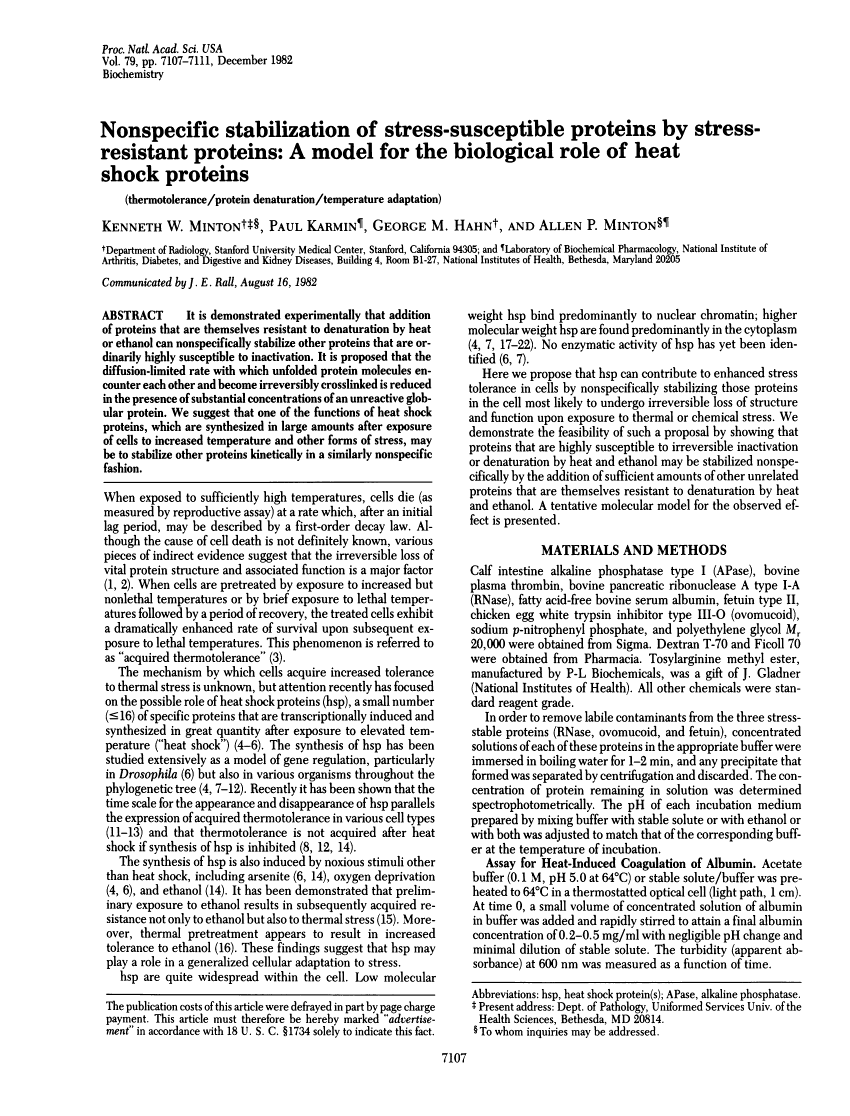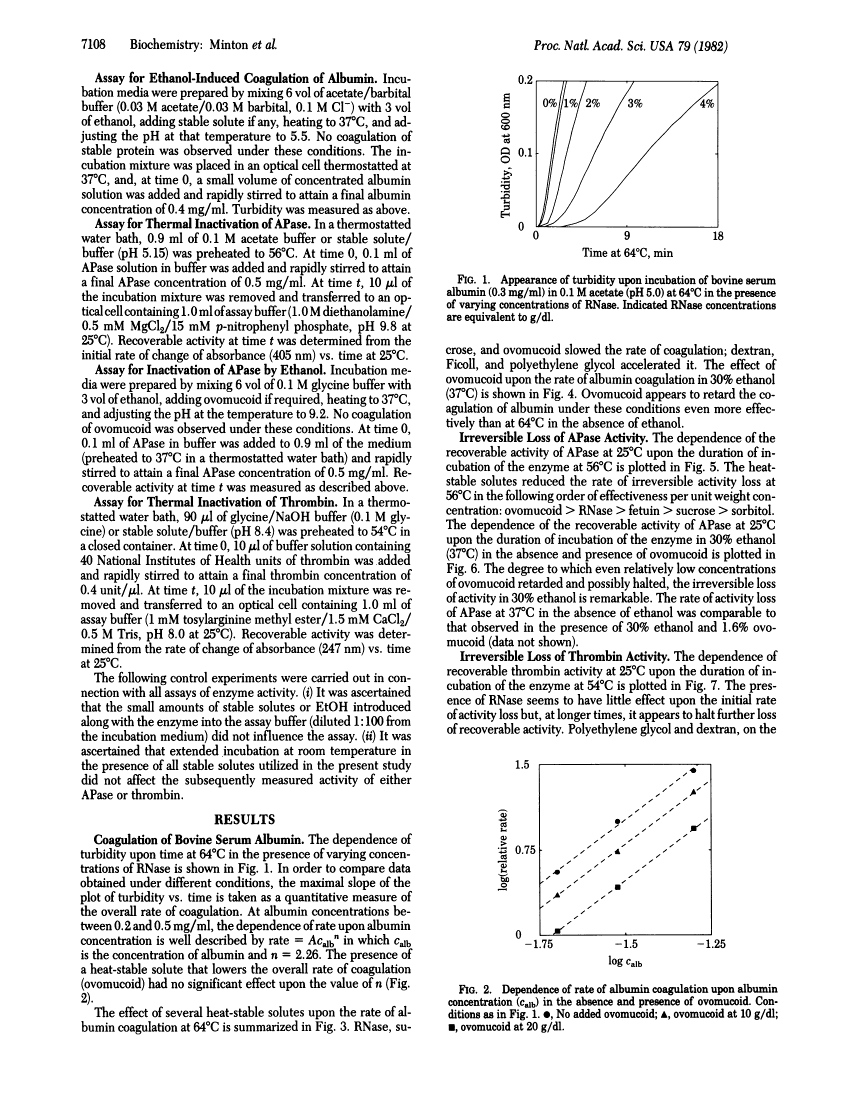Abstract
Free full text

Nonspecific stabilization of stress-susceptible proteins by stress-resistant proteins: a model for the biological role of heat shock proteins.
Abstract
It is demonstrated experimentally that addition of proteins that are themselves resistant to denaturation by heat or ethanol can nonspecifically stabilize other proteins that are ordinarily highly susceptible to inactivation. It is proposed that the diffusion-limited rate with which unfolded protein molecules encounter each other and become irreversibly crosslinked is reduced in the presence of substantial concentrations of an unreactive globular protein. We suggest that one of the functions of heat shock proteins, which are synthesized in large amounts after exposure of cells to increased temperature and other forms of stress, may be to stabilize other proteins kinetically in a similarly nonspecific fashion.
Full text
Full text is available as a scanned copy of the original print version. Get a printable copy (PDF file) of the complete article (1.0M), or click on a page image below to browse page by page. Links to PubMed are also available for Selected References.
Selected References
These references are in PubMed. This may not be the complete list of references from this article.
- Strom R, Crifo C, Rossi-Fanelli A, Mondovi B. Biochemical aspects of heat sensitivity of tumour cells. Recent Results Cancer Res. 1977;(59):7–35. [Abstract] [Google Scholar]
- Massicotte-Nolan P, Glofcheski DJ, Kruuv J, Lepock JR. Relationship between hyperthermic cell killing and protein denaturation by alcohols. Radiat Res. 1981 Aug;87(2):284–299. [Abstract] [Google Scholar]
- Henle KJ, Dethlefsen LA. Heat fractionation and thermotolerance: a review. Cancer Res. 1978 Jul;38(7):1843–1851. [Abstract] [Google Scholar]
- Guttman SD, Glover CV, Allis CD, Gorovsky MA. Heat shock, deciliation and release from anoxia induce the synthesis of the same set of polypeptides in starved T. pyriformis. Cell. 1980 Nov;22(1 Pt 1):299–307. [Abstract] [Google Scholar]
- Moran L, Mirault ME, Arrigo AP, Goldschmidt-Clermont M, Tissières A. Heat shock of Drosophila melanogaster induces the synthesis of new messenger RNAs and proteins. Philos Trans R Soc Lond B Biol Sci. 1978 May 11;283(997):391–406. [Abstract] [Google Scholar]
- Ashburner M, Bonner JJ. The induction of gene activity in drosophilia by heat shock. Cell. 1979 Jun;17(2):241–254. [Abstract] [Google Scholar]
- Kelley PM, Schlesinger MJ. Antibodies to two major chicken heat shock proteins cross-react with similar proteins in widely divergent species. Mol Cell Biol. 1982 Mar;2(3):267–274. [Europe PMC free article] [Abstract] [Google Scholar]
- Yamamori T, Yura T. Genetic control of heat-shock protein synthesis and its bearing on growth and thermal resistance in Escherichia coli K-12. Proc Natl Acad Sci U S A. 1982 Feb;79(3):860–864. [Europe PMC free article] [Abstract] [Google Scholar]
- Kelley PM, Aliperti G, Schlesinger MJ. In vitro synthesis of heat-shock proteins by mRNAs from chicken embryo fibroblasts. J Biol Chem. 1980 Apr 25;255(8):3230–3233. [Abstract] [Google Scholar]
- Landry J, Chrétien P, Bernier D, Nicole LM, Marceau N, Tanguay RM. Thermotolerance and heat shock proteins induced by hyperthermia in rat liver cells. Int J Radiat Oncol Biol Phys. 1982 Jan;8(1):59–62. [Abstract] [Google Scholar]
- Li GC, Petersen NS, Mitchell HK. Induced thermal tolerance and heat shock protein synthesis in Chinese hamster ovary cells. Int J Radiat Oncol Biol Phys. 1982 Jan;8(1):63–67. [Abstract] [Google Scholar]
- McAlister L, Finkelstein DB. Heat shock proteins and thermal resistance in yeast. Biochem Biophys Res Commun. 1980 Apr 14;93(3):819–824. [Abstract] [Google Scholar]
- Li GC, Werb Z. Correlation between synthesis of heat shock proteins and development of thermotolerance in Chinese hamster fibroblasts. Proc Natl Acad Sci U S A. 1982 May;79(10):3218–3222. [Europe PMC free article] [Abstract] [Google Scholar]
- Li GC, Hahn GM. Ethanol-induced tolerance to heat and to adriamycin. Nature. 1978 Aug 17;274(5672):699–701. [Abstract] [Google Scholar]
- Li GC, Shiu EC, Hahn GM. Similarities in cellular inactivation by hyperthermia or by ethanol. Radiat Res. 1980 May;82(2):257–268. [Abstract] [Google Scholar]
- Arrigo AP. Investigation of the function of the heat shock proteins in Drosophila melanogaster tissue culture cells. Mol Gen Genet. 1980;178(3):517–524. [Abstract] [Google Scholar]
- Arrigo AP, Fakan S, Tissières A. Localization of the heat shock-induced proteins in Drosophila melanogaster tissue culture cells. Dev Biol. 1980 Jul;78(1):86–103. [Abstract] [Google Scholar]
- Yamamori T, Ito K, Nakamura Y, Yura T. Transient regulation of protein synthesis in Escherichia coli upon shift-up of growth temperature. J Bacteriol. 1978 Jun;134(3):1133–1140. [Europe PMC free article] [Abstract] [Google Scholar]
- Back JF, Oakenfull D, Smith MB. Increased thermal stability of proteins in the presence of sugars and polyols. Biochemistry. 1979 Nov 13;18(23):5191–5196. [Abstract] [Google Scholar]
- Herskovits TT, Gadegbeku B, Jaillet H. On the structural stability and solvent denaturation of proteins. I. Denaturation by the alcohols and glycols. J Biol Chem. 1970 May 25;245(10):2588–2598. [Abstract] [Google Scholar]
- Lee JC, Timasheff SN. The stabilization of proteins by sucrose. J Biol Chem. 1981 Jul 25;256(14):7193–7201. [Abstract] [Google Scholar]
- Tanford C. Protein denaturation. Adv Protein Chem. 1968;23:121–282. [Abstract] [Google Scholar]
- Gros G. Concentration dependence of the self-diffusion of human and Lumbricus terrestris hemoglobin. Biophys J. 1978 Jun;22(3):453–468. [Europe PMC free article] [Abstract] [Google Scholar]
Associated Data
Articles from Proceedings of the National Academy of Sciences of the United States of America are provided here courtesy of National Academy of Sciences
Full text links
Read article at publisher's site: https://doi.org/10.1073/pnas.79.23.7107
Read article for free, from open access legal sources, via Unpaywall:
https://europepmc.org/articles/pmc347287?pdf=render
Citations & impact
Impact metrics
Citations of article over time
Smart citations by scite.ai
Explore citation contexts and check if this article has been
supported or disputed.
https://scite.ai/reports/10.1073/pnas.79.23.7107
Article citations
Immunodominant protein MIP_05962 from Mycobacterium indicus pranii displays chaperone activity.
FEBS J, 284(9):1338-1354, 10 Apr 2017
Cited by: 0 articles | PMID: 28296245
Characterization of succinimide stability during trypsin digestion for LC-MS analysis.
Anal Biochem, 526:1-8, 06 Mar 2017
Cited by: 10 articles | PMID: 28274724
Surface processing: existing and potential applications of ultraviolet light.
Crit Rev Food Sci Nutr, 55(4):469-484, 01 Jan 2015
Cited by: 8 articles | PMID: 24915377
Kinetics of polymer looping with macromolecular crowding: effects of volume fraction and crowder size.
Soft Matter, 11(3):472-488, 01 Jan 2015
Cited by: 29 articles | PMID: 25413029
A microRNA-27a mimic sensitizes human oral squamous cell carcinoma HSC-4 cells to hyperthermia through downregulation of Hsp110 and Hsp90.
Int J Mol Med, 34(1):334-340, 25 Apr 2014
Cited by: 16 articles | PMID: 24789751
Go to all (62) article citations
Similar Articles
To arrive at the top five similar articles we use a word-weighted algorithm to compare words from the Title and Abstract of each citation.
Increased thermostability of thermotolerant CHL V79 cells as determined by differential scanning calorimetry.
J Cell Physiol, 142(3):628-634, 01 Mar 1990
Cited by: 31 articles | PMID: 2312619
Will heat-stable proteins nonspecifically protect cells from thermal stress?
J Cell Physiol, 139(3):641-646, 01 Jun 1989
Cited by: 1 article | PMID: 2472415
Disulfide bonds and thermal stability in T4 lysozyme.
Proc Natl Acad Sci U S A, 85(2):401-405, 01 Jan 1988
Cited by: 67 articles | PMID: 3277175 | PMCID: PMC279556
How do cells respond to their thermal environment?
Int J Hyperthermia, 21(8):681-687, 01 Dec 2005
Cited by: 83 articles | PMID: 16338849
Review








